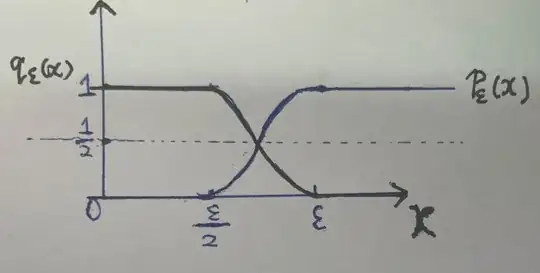We can achieve this using a cut-off function.

where $p_\epsilon$ is a smooth cut-off function and $(p_\epsilon)'\le \frac{C}{\epsilon}$, $q_\epsilon:=1-p_\epsilon$.
Define $\log^\epsilon(x):=q_\epsilon(x)\log(\epsilon )+p_\epsilon(x)\log(x)$, then $\log^\epsilon(x)$ is a smooth function, $\log(x)=\log^\epsilon(x),\forall x\ge\epsilon$ and
\begin{align*}
(\log^\epsilon(x))'=&p_\epsilon(x)\frac{1}{x}+\log(\epsilon) q_\epsilon'(x)+p_\epsilon'(x)\log(x)\\
\le& C\frac{1}{x}+(\log(x)-\log(\epsilon))p_\epsilon'(x)\\
\le& C\frac{1}{x}+C|\log(x/\epsilon)|\frac{1}{\epsilon}.
\end{align*}
We just need to consider the case $\frac{\epsilon}{2}\le x\le \epsilon$, in that case $|\log(x/\epsilon)|\frac{1}{\epsilon}\le C\frac{1}{x}$. So we obtain $$(\log^\epsilon(x))'\le C\frac{1}{x}, \forall x\ge 0,$$
where $C$ is not depend on $\epsilon$.

